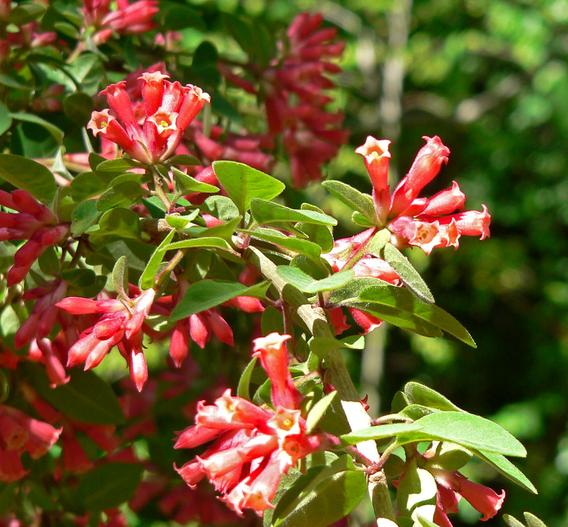Early Jessamine
(Cestrum fasciculatum)
Early Jessamine (Cestrum fasciculatum)
/
/

Stan Shebs
CC BY-SA 3.0
Image By:
Stan Shebs
Recorded By:
Copyright:
CC BY-SA 3.0
Copyright Notice:
Photo by: Stan Shebs | License Type: CC BY-SA 3.0 | License URL: https://creativecommons.org/licenses/by-sa/3.0 | Uploader: Stan Shebs | Publisher: Wikipedia Commons




















Estimated Native Range
Summary
Cestrum fasciculatum, commonly known as Early Jessamine, is a semi-deciduous shrub native to the understory of tropical forests in Central and Southern Mexico. This plant typically grows to a height of over two meters and exhibits a somewhat sprawling habit. The stems, particularly the new growth, can exhibit a purple hue and are slightly hairy. Early Jessamine is characterized by its hairy, oval-shaped, pointed green leaves that can reach up to 13 centimeters in length. The shrub is notable for its dense clusters of inflorescences that appear at the tips of branches, each cluster containing up to 10 tubular, hairy red flowers, each 2 to 3 centimeters in length, including the elongated calyx of sepals and the long corolla. Following the flowering season, the plant produces berries that are about 1.5 centimeters wide, red on the outside, and white inside, containing approximately 10 small brown seeds.
Early Jessamine is appreciated for its unique flowering clusters that add a tropical flair to gardens. It is suitable for use in mixed borders, as a background plant, or in a subtropical garden setting. Gardeners should provide it with full sun to part shade, ensure medium water availability, and plant it in soil with medium drainage to achieve optimal growth. While it is not particularly drought-tolerant, it can adapt to a range of soil conditions. It is relatively low-maintenance but may require pruning to maintain a tidy appearance.CC BY-SA 4.0
Early Jessamine is appreciated for its unique flowering clusters that add a tropical flair to gardens. It is suitable for use in mixed borders, as a background plant, or in a subtropical garden setting. Gardeners should provide it with full sun to part shade, ensure medium water availability, and plant it in soil with medium drainage to achieve optimal growth. While it is not particularly drought-tolerant, it can adapt to a range of soil conditions. It is relatively low-maintenance but may require pruning to maintain a tidy appearance.CC BY-SA 4.0
Plant Description
- Plant Type: Shrub
- Height: 6-8 feet
- Width: 4-6 feet
- Growth Rate: Moderate
- Flower Color: Red
- Flowering Season: Fall
- Leaf Retention: Semi-Deciduous
Growth Requirements
- Sun: Full Sun, Part Shade
- Water: Medium
- Drainage: Medium
Common Uses
Bird Garden, Butterfly Garden, Fragrant, Hummingbird Garden, Low Maintenance, Showy Flowers
Natural Habitat
Understory of tropical forests in Central and Southern Mexico
Other Names
Common Names: Red Cestrum, Juvelbuske
Scientific Names: , Cestrum newelli, Cestrum fasciculatum, Cestrum hartwegii, Habrothamnus fasciculatus, Cestrum hartwegii var. pedicellatum, Cestrum hartwegii var. pubescens, Meyenia fasciculata, Cestrum fasciculatum var. gracile, Cestrum spigelioides
GBIF Accepted Name: Cestrum fasciculatum (Schltdl.) Miers